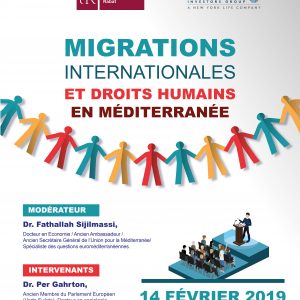Morocco is unquestionably a country of strategic significance to the EU in many respects. That is particularly true with regard to migration, which was one reason why the Université Internationale in Rabat wished to have an EU speaker at its conference on ‘International Migration and Human Rights in the Mediterranean’ on 14 February. As the person chosen under the FMA’s Campus programme to take on this role, I tried to outline the EU’s current policies on migration and human rights. Coming from Sweden, it was also natural for me to mention the crisis in 2015, when Sweden accepted 170 000 asylumseekers, as against the normal figure of 30,000 – 40,000, while other EU countries closed their borders, built walls and in addition torpedoed the European Commission’s proposal for an equitable distribution of refugees. I observed that cooperation between EU and MENA (Middle Eastern and North African) countries was important in order to deal with migration in a humanitarian manner and in accordance with international law. At the same time, I was aware that cooperation between the EU and Morocco is by no means uncomplicated. On 12 February, while I was in Morocco, the European Parliament approved by 415 votes to 189, with 49 abstentions, a fisheries agreement with Morocco which was also intended to apply to fisheries off Western Sahara, even though the Court of Justice of the EU had ruled that an EU agreement with Morocco must not apply to Western Sahara. The decision was welcomed wholeheartedly in the Moroccan media and I was asked whether it should not be interpreted as a de facto recognition that Western Sahara belonged to Morocco. But on the European Commission’s website (12 February) it was stated that the agreement did not constitute a recognition of Moroccan sovereignty over the territory of Western Sahara. On the other hand, it was stressed that Morocco was obliged to report to the EU that the agreement, under which the EU was to pay Morocco EUR 160 million over four years, was benefitting Western Sahara economically.
With regard to Sweden, Al-Adath Al-Maghribiya stated that Sweden had supported the Polisario Front previously, but had backtracked, and representatives of Sweden’s Foreign Ministry now absolutely denied that there was any plan to recognise the Sahrawi Republic.
So what is the true state of affairs? Is not the whole EU in the process of backtracking from its united position on the UN’s demand for a referendum on the status of Western Sahara? Where Sweden is concerned, many people suspect that a deal has been done: two Swedish governments, one conservative and the other red-green, have disregarded the Swedish Parliament’s decision of 2012 to recognise the Sahrawi Republic, while Morocco has entered into cooperation with Sweden to take back the hundreds of Moroccan street children who suddenly turned up in Stockholm a year or two ago.
And when, despite the clear ruling delivered by the Court of Justice to the effect that no agreement between the EU and Morocco should apply to Western Sahara, the European Parliament nonetheless approved a fisheries agreement that covered that territory, did not that constitute a first step towards a retreat from the UN position? It is to be hoped that the talks recently initiated under the auspices of the UN will result in a peaceful solution. Perhaps not a sovereign Western Saharan state. But at least a separate, autonomous region, maybe like Scotland. And in some kind of union with Morocco. First, however, the referendum which was decided upon and which was supposed to have been held nearly 30 years ago, must be carried out.
Obviously there are serious practical problems attached to this, including that of deciding who should have the right to vote in it. But it is hard to imagine any solution being acceptable to all parties if it has not been supported in a referendum. This is a question of respect for international law and for the UN’s role in peace-making. And that is something for which the EU bears a huge amount of responsibility.


